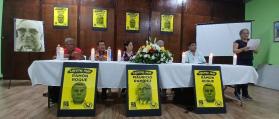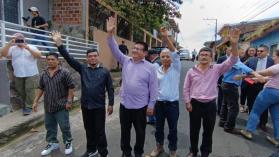El Salvador’s Constitutional Chamber Under Fire in Human Rights Commission
On Monday, March 20th, a delegation of former and current Salvadoran functionaries came to Washington DC for hearings at the Inter-American Commission on Human Rights (IACHR), an autonomous organ of the Organization of American States, to denounce the Constitutional Chamber of El Salvador’s Supreme Court for violating their civil and political rights. They were received by IACHR Executive Secretary Paulo Abrão, who expressed direct interest in this issue.
El Salvador’s Supreme Court is made up of four chambers – the Constitutional Chamber, the Civil Chamber, the Criminal Chamber, and the Administrative Disputes Chamber. Since 2010, the Constitutional Chamber has been repeatedly criticized for jurisdictional overreach and accused of serving the interests of El Salvador’s economic elite and right-wing opposition.
The majority of the cases filed in the IACHR are related to the Constitutional Chamber’s dubious interpretation of articles in the Constitution that require independence and impartiality from public functionaries. The Chamber has interpreted this to mean that functionaries elected by the Legislative Assembly may not have any partisan link, a requirement that has never existed before and is not explicitly mentioned in the Constitution. In fact, Article 72 of El Salvador’s Constitution guarantees all Salvadoran citizens’ right to belong to or form political parties; and Article 82, the only article that prohibits specific categories of individuals from belonging to political parties, only prohibits partisan affiliation and electoral campaigning for religious leaders, active duty members of the military, and members of the National Civilian Police. Former president of the Constitutional Chamber Dr. José Salomon Padilla, who was removed from his post by his own bench mates, told CISPES that the Chamber has effectively modified the Constitution through its rulings, a power that the Constitution gives solely to the Legislative Assembly.
Not only does the Chamber’s interpretation of independence and impartiality violate the civil and political rights conferred by the Constitution and international treaties, but this interpretation has been applied arbitrarily and disproportionately affected progressive and leftist functionaries. Despite multiple cases submitted to the Constitutional Chamber against public functionaries with well-documented ties to ARENA, including against two of the Chamber’s own magistrates (Belarmino Jaime and Rodolfo Gonzalez, whose own elections did not follow constitutional procedure), none of these cases have been accepted.
Furthermore, the definition of “links to political parties” has become quite nebulous and, in several cases, individuals who had never had any official link to a party nor been a militant or affiliate of a party have been removed from office. Padilla has drawn parallels between the effect of these constitutional rulings and the open and official wartime persecution of progressives and leftists, noting that now, fortunately, State security forces are no longer involved in this persecution. He told CISPES, “It has gotten to the point where someone could be removed because a photo was taken of them walking in front of a party’s headquarters or because they have been friends since childhood with the leader of a party.”
According to suspended Supreme Electoral Tribunal magistrate Jesús Ulises Rivas Sánchez, who participated in last week’s IACHR hearings, "What we hope is that in the next session of hearings, the systematic human rights abuses that the Constitutional Chamber is committing are put on the agenda, and the Inter-American Commission [on Human Rights] can analyze the legal argument being used and, little by little, guarantee that Salvadoran men and women can exercise the total ideological liberty that [our] Constitution guarantees."
Salvadoran cases at the IACHR for violations of civil and political rights by the Constitutional Chamber:
- Jesús Ulises Rivas Sanchez – Rivas was suspended from his post as a Supreme Electoral Tribunal (TSE) magistrate by a Constitutional Chamber injunction on February 24th of this year. The Chamber cited connections to the leftist Farabundo Martí National Liberation Front (FMLN) party as the rationale for his suspension despite the fact that Rivas has never been a militant or affiliate of the FMLN and identifies as an independent progressive.
As evidence of his connection to the party, the Chamber cited an event he participated in before he was ever elected to the TSE, in which a guild of lawyers he belonged to received a visit from then-FMLN presidential candidate Salvador Sanchez Cerén and expressed their support for his proposed government plan, a very common type of activity during campaign season in El Salvador when candidates seek endorsements from different sectors.
The case against Rivas’ election was presented with nine other cases that claimed all five magistrates of the TSE, as well as their five alternates, had partisan links; however, the Chamber only accepted the case against Rivas despite evidence that more strongly linked other TSE members to right-wing parties.
This case is of special concern because of upcoming elections in 2018 and 2019 and the impact Rivas’ removal has had on the correlation of forces in the country’s electoral authority. The TSE was created by the Peace Accords that ended El Salvador’s Civil War and was designed as a pluralist space to protect against the blatant electoral fraud of the past that had contributed to causing the Civil War. Despite this noble intention, from 1994-2009 the TSE was dominated by magistrates affiliated with right-wing parties and reports of irregularities and possible fraud were common. Since 2009, the election of several leftist and progressive magistrates has forced the tribunal to engage in more robust debates in search of consensus, and the transparency and credibility of El Salvador’s elections have improved greatly.
But with the removal of Rivas, whose new replacement has publicly declared “I am right wing,” the TSE has returned to a state of right-wing domination, with one lone progressive member who will likely be consistently outvoted. Social movement groups and civil society organizations have expressed concern that this will reverse the progress that has been made since 2009 to combat fraud.
- Dr. José Salomón Padilla – Padilla was removed from his post as president of the Supreme Court of Justice and president of the Constitutional Chamber by his fellow bench mates on two separate occasions.
He was first elected to the Supreme Court of Justice by the Legislative Assembly in 2012 along with four other magistrates; but several days before they were to be sworn in, the Constitutional Chamber declared their election unconstitutional because the legislature that elected them had already elected five Supreme Court magistrates three years prior. The Constitution requires the Legislative Assembly elect five Supreme Court magistrates every three years, and the Constitutional Chamber interpreted this to mean each legislature (which have three-year terms) could only elect one set of five Supreme Court magistrates.
After a 27-day negotiation between all political parties and facilitated by then-president Mauricio Funes, legislators agreed to hold the elections again, now in a new legislature, and elect the same magistrates, including Padilla, that had been blocked from taking office. After serving a little over a year as president of the Constitutional Chamber – and almost always being the sole dissenting opinion – Padilla’s fellow bench mates ruled his election unconstitutional because of his ties to the FMLN. Padilla is a registered affiliate of the FMLN but did not hold any leadership position within the party.
- Tito Edmundo Zelada Mejía – Zelada was removed from his post as president of the National Council of the Judiciary in 2015 for links to the FMLN which were evidenced by media reports that, according to the Constitutional Chamber, demonstrated his preference for the leftist party.
The National Council of the Judiciary, whose members are elected by the Legislative Assembly with a two-thirds majority, is the body charged with nominating a list of candidates for Supreme Court magistrates from which the Legislative Assembly chooses whom to elect. Legal experts have criticized the Constitutional Chamber’s removal of Zelada as self-serving, given that four of the Chamber’s members’ terms end in 2018, and the National Council of the Judiciary will be responsible for nominating them for re-election or not.
- Former alternate legislators (thirty of them filed a joint case) – In one of its most egregious rulings, in 2016 the Constitutional Chamber removed all 84 alternate legislators that had been elected by popular vote the previous year. In El Salvador, as in many Latin American countries, legislators run with an alternate whose candidacy is registered alongside theirs, and alternate legislators can substitute legislators of their same party when a legislator cannot perform their functions due to illness, travel, or other circumstances.
In this ruling, the Chamber violated due process at many turns. The original case presented contained no mention of the alternate legislators’ election; in fact, the case that was filed questioned the constitutionality of a legislative vote that authorized the Treasury to put $900 million in government bonds on the market to fund security programs and restructure short-term debt, arguing that legislative procedures had been violated during the vote. After the Constitutional Chamber dismissed the plaintiff’s arguments, they illegally introduced their own additional argument: that the system for electing alternate legislators was unconstitutional, and therefore the vote (which included votes from alternate legislators) was unconstitutional.
The final ruling not only blocked the emission of the bonds, aggravating the country’s fiscal crisis but also nullified the election of all 84 alternate legislators in the current legislature. Since these alternate legislators were elected after the vote in question had occurred, they did not even know their election was being questioned and had no opportunity to present a defense. The retroactive nature of the ruling was also arbitrarily applied, as many legislative decisions that included votes from alternate legislators – including the election of the current magistrates in the Constitutional Chamber – were not impacted.

 "I am a CISPES supporter because continuing to fight for social justice and a more people-centered country means continuing the dream and sacrifice of thousands of my fellow Salvadorans who died for that vision.” - Padre Carlos, New York City
"I am a CISPES supporter because continuing to fight for social justice and a more people-centered country means continuing the dream and sacrifice of thousands of my fellow Salvadorans who died for that vision.” - Padre Carlos, New York City

